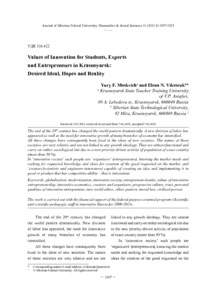Ценности инновационной деятельности для студентов, экспертов и предпринимателей Красноярска: желаемый идеал, надежды и реальность
URI (для ссылок/цитирований):
https://elib.sfu-kras.ru/handle/2311/2569Автор:
Москвич, Ю.Н.
Moskvich, Yury N.
Викторук, Е.Н.
Viktoruk, Elena N.
Дата:
2011-11Аннотация:
The end of the 20th century has changed the world pattern dramatically. A new division of labor has
appeared as well as the need for innovative growth of many branches of economy has intensified.
All these changes have consequently been fixed in the ideas of new societies. The names of these
societies are very relative and are not linked to any growth ideology. They are utmost functional and
carry on rather sociological tint due to a new priority-driven activity of population of exact country
(more than 50 %).
In innovative society such people are organizers (entrepreneurs), knowing the market needs and
seeking for requested knowledge and ideas for creation of the good requested on the market ,and
creators(scientists and engineers-innovators) capable of creating an idea and implementing it in
good or product that has competitive ability - that is innovation. Конец ХХ века резко изменил картину экономического развития мира. Возникло новое
разделение труда, усилилась потребность в системном инновационном развитии многих
отраслей экономики, образования и общественной жизни. Эти изменения последовательно
фиксировались в идеях новых видов обществ. Названия этих обществ условны и не
связаны с какой-либо идеологией развития. Они предельно функциональны и несут в себе явно социологическую окраску, поскольку в их названиях отчётливо отражается новый
приоритетный тип деятельности населения (более 50 %) конкретной страны. В «инновационном
обществе» такими людьми являются «организаторы» (предприниматели-антрепренеры),
знающие потребности рынка и ищущие необходимые знания (идеи) для создания нужного
востребованного на рынке продукта, и «творцы» (ученые и инженеры-новаторы), способные
создать идею и реализовать ее в конкурентоспособном продукте - инновации.
Коллекции:
Метаданные:
Показать полную информациюСвязанные материалы
Показаны похожие ресурсы по названию, автору или тематике.
-
The Model of Innovation Development Metasystem
Batukova Louise; Bagdasaryan Naira; Belyakova Galina; Vladimirova Olga; Belyakov Sergey (SOC ROMANA PENTRU ASIGURAREA CALITATII, BUCHAREST, 2019)Different fields of science from philosophy and institutional theory to theories of management, technological development and economics explore innovative transformations - mainly in terms of technical and institutional ... -
Формирование модели научно-технологической и инновационной политики в субъекте Российской Федерации
Бывшев, В. И.; Byvshev, Vladimir I. (Journal of Siberian Federal University. Сибирский федеральный университет, 2024-01)Переход передовых экономик к VI технологическому укладу, затянувшаяся череда глобальных политических и экономических кризисов, вызвавших беспрецедентное санкционное давление на Россию и ограничение ее к импорту высоких ... -
Innovative qualities of today's young students (as exemplified by the Siberian Federal University)
Kistova, A. V.; Pimenova, N. N.; Reznikova, K. V.; Seredkina, N. N.; Zamaraeva, Ju. S. (2015-12)This paper looks into young people’s attitudes to innovation. It goes without saying that being innovative is more than just an adaptation tool in a modern society; it is also a personal characteristic allowing one to be ... -
Innovation management as a system management tool in the modernization of the services sector
Marina, Vladimirovna Malakhovskaya; Aida, Talyatovna Petrova; Olga, Nikolaevna Vladimirova; Iradatalyatovna, Rustamova (2016-12)The formation of a new quality of services is mediated by the capacity forthe continuity of the innovation process. The need for innovation managementis caused by the blurring of the boundaries between marketing, organization, ... -
INNOVATION MANAGEMENT AS A SYSTEM MANAGEMENT TOOL IN THE MODERNIZATION OF THE SERVICES SECTOR
Malakhovskaya, M. V.; Petrova, A. T.; Vladimirova, O. N.; Rustamova, I. T. (2016-12)The article puts forward and verifies the hypothesis of the need for the end-to-end innovation for business development and the hypothesis of the coherence between the degree of individualization of technologies and products ...

